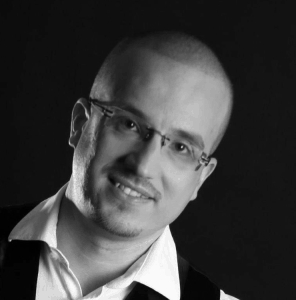 BankToTheFuture, an equity crowdfunding platform based in the United Kingdom, recently announced they intend on becoming an Investment Bank – and they are crowdfunding themselves to achieve this goal. Presently they are attempting to raise £2 Million on their platform. As of today they have raised over £340,000 towards this goal. The offer represents a 25% equity stake in the company.
BankToTheFuture, an equity crowdfunding platform based in the United Kingdom, recently announced they intend on becoming an Investment Bank – and they are crowdfunding themselves to achieve this goal. Presently they are attempting to raise £2 Million on their platform. As of today they have raised over £340,000 towards this goal. The offer represents a 25% equity stake in the company.
Simon Dixon, co-founder and CEO of BankToTheFuture, believes “the major problem with banking today is the lack of transparency”. BankToTheFuture hopes to change all of this.
Klaus-Martin Meyer: Simon, you are co-founder and CEO of BankToTheFuture. Would you please introduce yourself and your company to our readers?
Simon Dixon: BankToTheFuture.com was founded to let people invest in private companies starting from as little as £10 and to have more say over what happens to their savings and investments. At the moment we focus on the equity markets and it is like an online dragons den, democratising investing so anybody can be a dragon and invest in companies that they like. We wish to expand and offer debt products and secure an investment banking licence in order to give people more options with how they invest their money online.
I originally started as a tea boy for stock brokers TD WaterHouse, eventually I got my way onto the trading floor as a market maker for investment bank KBC before my final corporate role in Corporate Finance. After meeting successful business owners taking their companies public I decided I was on the wrong side of the desk and set up my first business in 2006 qualifying students to work in investment banking. This was angel funded by billionaire Peter Hargreaves and gave me a first introduction to what it is like to secure angel funding. We had a tough run in the financial crisis so I began to channel my efforts into alternative finance and sustainable banking. I wrote the book ‘ Bank To The Future’ on the future of finance and got more involved in not-for-profits focused on submissions for the independent commission on banking. I then decided to put a team together and build BankToTheFuture.com with our co-founder Bliss Dixon to build our Crowd-Investment Bank. We raised all our seed funding from the Crowd on our own platform and have recently launched a new record bid to raise £2m from the crowd in exchange for shares in BankToTheFuture.com
We have two missions – one to democratise investing so that anybody can be an investor in a responsible way and offer more financial inclusion to an asset class that was previously only available to the rich. Secondly we want to get more money into the productive side of the economy and help businesses get investment ready so they can secure funding from those that are really interested in what they do. It has traditionally been very hard to secure funding for a private company, especially those looking to raise less than £1m.
 Klaus-Martin Meyer: At the moment you are aiming to raise 2.000.000 GBP in order to establish “The First CrowdFunded Transparent Investment Bank”. What exactly does that mean?
Klaus-Martin Meyer: At the moment you are aiming to raise 2.000.000 GBP in order to establish “The First CrowdFunded Transparent Investment Bank”. What exactly does that mean?
Simon Dixon: When we founded BankToTheFuture.com our goal was to take the processes that are used to raise billions for large companies, strip out the high costs, take it online, make it available for smaller businesses and investors and add transparency to the process.
So eventually we want to offer transparent versions of many of the services a traditional investment bank offers but for smaller businesses. Technically, this means applying for an investment banking licence with our regulator, the FCA and PRA, and a series of permissions to perform certain activities. At this stage I can’t give more details till we launch further services.
The major difference is transparency and the fact that what gets funded will be with the knowledge of those that fund it, but we still need large legislative changes from the government in order to allow us to compete on a more level playing fired with orthodox banks. The government have shown a great commitment to lower the barriers to startup banks and we have been involved in much of the change. CrowdFunding is one part of the change, to get real change we need to change banks so they don’t own our money, can’t spend our money and can’t create our money. We need a huge stimulation of local community banks in the UK like in Germany and we need to let the world know about CrowdFunding, which is essentially ideological based funding, rather than geographical based funding, as investors tend to be those that share a common vision and ideology for the business.
We are planning to get a banking licence in a way that has never been done before. What we are doing has never been done, we are creating jobs that have never been created before and that requires new regulations and changes, we have no plans on retail banking though.
Klaus-Martin Meyer: Can you explain us, why your service is a disruptive innovation for the banking industry?
Simon Dixon: The major problem with banking today is the lack of transparency. No matter how many regulations are implemented it does not change the fact that depositors, investors and shareholders have no idea what happens with the money. A retail banking licence effectively means that banks own depositors money, can spend that money as they wish and have the ability to create money through the issuance of credit. Bank loans tend to go to either the least risky or most profitable. It is why approximately 80% of the major UK banks loan book go to either property loans (As they are backed by assets) or financial speculations (As it is the most profitable). Last in line is a business, but businesses create most of the UK’s jobs and contribute to the non-inflationary productive part of our economy.
When you add transparency to the equation people will get more used to knowing what happens with their money and hopefully ask their banks more questions and be less accepting. We are witnessing the dis-intermediation of finance as more and more products become Crowd based products, where people decide where money flows rather than banks or financial intuitions.
 Klaus-Martin Meyer: In my awareness BankToTheFuture.com is the only crowdfunding plattform that is combining equity based and reward based crowdfunding in the same pitch. How successful is this approach so far?
Klaus-Martin Meyer: In my awareness BankToTheFuture.com is the only crowdfunding plattform that is combining equity based and reward based crowdfunding in the same pitch. How successful is this approach so far?
Simon Dixon: We have found that when given the choice friends, family, investors and supporters are often more willing to back a pitch for a reward than go through the legal formalities and compliance of investing. In fact over 50% back a pitch when given the choice over investing. The amounts invested are a lot greater though when investing and account for over 90% of the money transacted through our platform. We were the first to do this model as far as I am aware.
Klaus-Martin Meyer: How important will it be for BankToTheFuture.com (and the future of crowdfunding in general) that the “old boys from the City” will jump on the crowdfunding band waggon?
Simon Dixon: I believe that we now live in a transparent world and that the people will choose us over the traditional financial institutions as they start to realise that this is a much more efficient way of allocating finance. Traditional banks and financial institutions are plagued by legacy issues and still believe that Twitter does not fit into their compliance model and that contracts can only be signed face-to-face.
Maybe I am ignorant, but my belief is that the people will choose to use the platforms with the genuine mission rather than those jumping on the band wagon that have got so much wrong in the past. We are in the hands of the people though and the people decide by participating or sitting on the fence. That is why we chose to raise finance for our company through the Crowd rather than venture capitalists. Our future is in the hands of the crowd if they choose to invest or back us.
Klaus-Martin Meyer: What do you think about the fact that companies like Google (and as published this week) Rocket Internet are entering the market for crowdlending and not yet the traditionals banks?
Simon Dixon: I believe that Google, Apple, Amazon and Facebook all have their eyes on banking and indeed all have licenses to perform regulated activities. I think they are more focused on consumer finance rather than business finance though as the market is a lot larger. I am sure the banks will catch on, but my belief is that it will be too late and they have lost the publics trust beyond return. People will see through it and transparency will avail. Only time will tell. Banks have a lot to loose as well as their current model is a lot more profitable than the Crowd Funded model so they do not want to encourage that. Google investing in Crowd Finance can only be good for the sector, but we prefer the backing of the crowd and we want to proove that the crowd can invest collectively as much as Google ventures and other venture capitalists. Only the people decide if that happens though.
____________________________
 Klaus-Martin Meyer is the founder and operator of German crowdfunding blog Crowdstreet.de. A version of this article was previously published on his site.
Klaus-Martin Meyer is the founder and operator of German crowdfunding blog Crowdstreet.de. A version of this article was previously published on his site.

